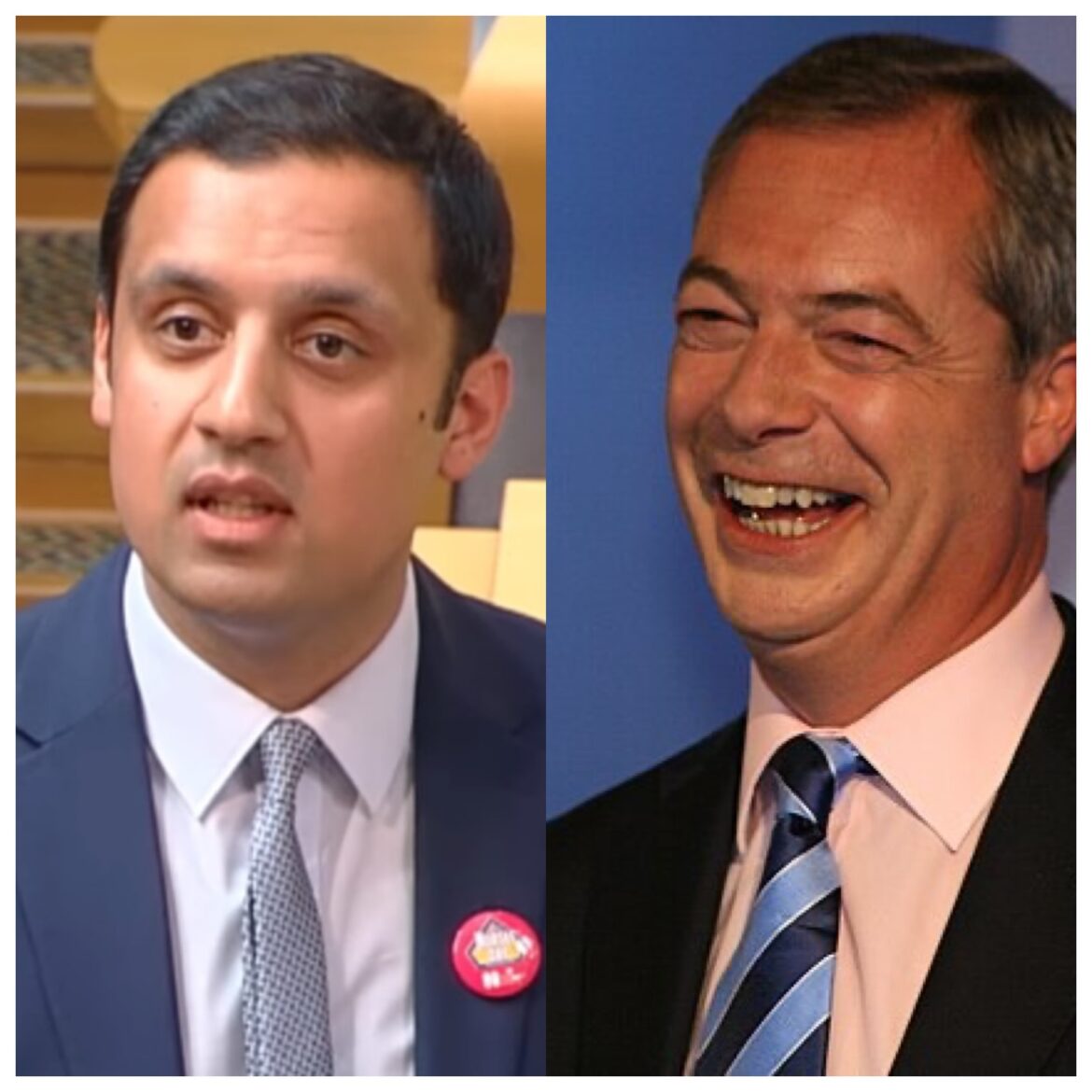Nigel Farage has been challenged to a head-to-head debate by Scottish Labour leader Anas Sarwar following accusations of racism over a Reform UK campaign advert – even as Labour’s own by-election candidate dodges local hustings.
The Reform leader, who accused Sarwar of introducing “sectarianism” into Scottish politics, now faces calls to defend his party’s controversial campaign material in next Thursday’s Hamilton, Larkhall & Stonehouse by-election.
In a direct challenge, Sarwar said: “If Nigel Farage wants to come to Scotland and spread his politics of division, he should have the courage to debate me directly. Let’s see if he can defend his racist adverts face to face.
The row erupted after Reform UK published campaign material that critics say crossed the line into racial stereotyping, though the party insists it merely highlights legitimate concerns about immigration and integration.
Farage hit back yesterday, accusing Sarwar of “playing the race card” and attempting to introduce “sectarianism” into Scottish politics – a particularly loaded charge given Scotland’s history of religious division.
Anas Sarwar is desperate to distract from Labour’s failures by crying racism at every opportunity,” Farage said. “He’s the one dividing communities, not us.”
The irony of Labour demanding debates hasn’t been lost on local observers, given their own candidate in the by-election has failed to appear at multiple community hustings, citing “diary conflicts.
It’s a bit rich for Labour to demand Farage debates when their own candidate won’t even face local voters,” said SNP campaign coordinator Margaret Thomson. “Where’s the accountability there?”
The by-election, triggered by the resignation of the previous MSP, has become an unexpected flashpoint in the broader battle over immigration and identity politics in Scotland.
Reform UK’s campaign has focused heavily on immigration concerns, with adverts that Labour claims use “dog whistle” imagery and language designed to stoke racial tensions.
This isn’t legitimate political discourse – it’s racism dressed up as concern for local communities,” Sarwar insisted. “Farage knows exactly what he’s doing.”
But Reform supporters argue they’re simply addressing issues other parties ignore. We’re talking about the concerns real people have,” said local Reform organiser James Mitchell. “If that makes Sarwar uncomfortable, perhaps he should listen to voters more.”
The debate challenge comes as Farage separately pushes for a showdown with Sir Keir Starmer at a working men’s club in England’s Red Wall – part of his strategy to position Reform as the authentic voice of traditional Labour voters.
“I’ll debate anyone, anywhere,” Farage declared. “But I won’t be lectured on division by politicians who’ve abandoned their own communities.”
Scottish political analyst Dr Helen Morrison believes the row plays into both leaders’ strategies: “Sarwar needs to shore up Labour’s anti-racist credentials while Farage benefits from being seen as the outsider challenging the establishment.
The controversy has overshadowed local issues in the by-election, with candidates struggling to focus voter attention on health services, housing, and employment concerns.
People are worried about their bills and local services,” complained independent candidate Robert Brown. “Instead we’re having this circus about who said what about whom.”
Labour’s missing candidate, meanwhile, has become a subplot of its own. Sarah Williams has attended only one of five scheduled hustings, leading opponents to question her commitment to the constituency.
How can Labour attack anyone else’s campaign when their own candidate won’t even show up?” asked Conservative candidate Michael Hughes. “It’s contemptuous of voters.”
Labour sources claim Williams has been meeting voters “on the doorstep” but critics suggest she’s been kept away from public forums where she might face difficult questions about Labour’s national policies.
The racial dynamics of the debate are particularly sensitive given Sarwar’s position as Scotland’s first Muslim leader of a major political party. He’s previously spoken about facing racism in politics and sees calling it out as part of his responsibility.
“When I see racist campaign tactics, I won’t stay silent,” Sarwar said. That’s not playing the race card – that’s standing up for decency.
Reform UK vehemently denies any racial motivation, with Scottish organiser Patricia Clark saying: “We welcome supporters from all backgrounds. What we oppose is uncontrolled immigration that hurts working-class communities of all colours.
The proposed debate format remains unclear, with both camps suggesting different venues and moderators. Sarwar wants a formal television debate while Farage prefers a town hall format with “real voters, not handpicked audiences.
Let’s do it in a community centre in Hamilton,” Farage suggested. “Let local people ask the questions. I suspect Anas wouldn’t last five minutes with real scrutiny.
Political observers note the debate challenge serves both leaders’ purposes regardless of whether it happens. Sarwar positions himself as anti-racist while Farage reinforces his outsider status.
This is political theatre,” noted Professor James Anderson of Edinburgh University. Both men benefit from the confrontation itself, perhaps more than from any actual debate.
The by-election has attracted unusual national attention, with both major party leaders using it as a proxy battle for bigger arguments about immigration, identity, and who speaks for working-class communities.
Local resident Mary Patterson expressed frustration with the focus on national figures: “We need someone to fight for better bus services and fix our high street, not Westminster politicians having a shouting match.
As polling day approaches, the question remains whether either debate will actually happen. Sarwar has cleared his diary while Farage insists any debate must fit around his UK-wide campaign schedule.
“I’m ready when he is,” Sarwar said. “But I won’t hold my breath. Nigel Farage is better at making noise than standing behind his words.
Farage’s response was characteristic: “I’ll debate him after he explains why his own candidate is hiding from voters. Glass houses, Anas, glass houses.”
Meanwhile, in Hamilton, Larkhall & Stonehouse, voters prepare to choose their next MSP – possibly without ever seeing Labour’s candidate at a public forum or witnessing the much-hyped Farage-Sarwar showdown.
As one exasperated local summed up: “They’re all talking about each other instead of talking to us. Same old politics, different accents.



